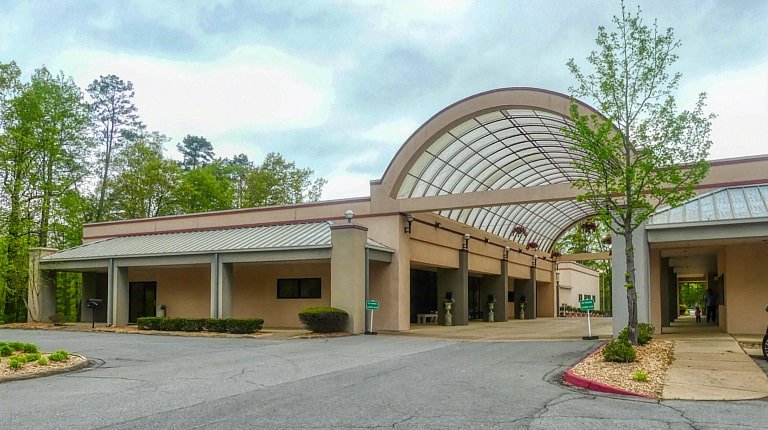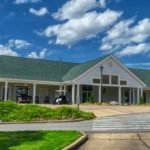Board and Former GAC Members Discuss Advantages of Having National, State, and Regional Relationships
Jim Zahnd; J.P. Keith Keck; General Tom Arwood; and Teri Jackson gave a presentation to the Board regarding the value and necessity of relationships with officials outside of the gates. Jim Zahnd spoke first. (Note: J.P. Keith Keck is still a GAC Member.)
Nineteen-year Hot Springs Village resident and former GAC member, Jim Zahnd, has worked hard to help develop village relationships with outside government agencies. In the past, Zahnd served as a Justice of the Peace to advance HSV’s relationship with other officials. Zahnd began the Wednesday, April 6, 2022 presentation to the Board by introducing the speakers and the newly elected GAC Chair, Bob Pettey, and GAC Vice-Chair Sam Sacco.
General Tom Arwood
Former Chair of the Board and former Chair of GAC, General Tom Arwood spoke first, sharing some GAC History.
Arwood said that around 2000, the President of the Board, asked him if he would chair a committee on long-range planning. At that time, the plan the Village had was “not very sound and not very realistic.”
While chairing this planning committee for a couple of years, he came to realize there was a chasm between HSV and our neighbors.
They ran into an attitude from Villagers feeling that the surrounding communities don’t like us. “They don’t like us downtown. All they want us to do is come spend our money. Why should we care what they do?”
Arwood said, “‘What are you doing about it?’ If we have a situation like that and we all enjoy what we are doing and where we are living, if we’re not getting along with our neighbors and our neighbors are important – we’re paying the taxes.”
“We found we needed to educate our neighbors and friends in the area.”
The committee recommended that the Board take a look at this. “How do we educate our neighbors? Our neighbors include the built-up areas of Hot Springs, Benton, and the counties.”
We are paying taxes in these communities; “where do we interface to make sure that ‘our needs or our desires are addressed?'”
- What are we?
- What are we about?
- How can we influence your community and be part of it?
At that time, more Villagers became involved in the activities of the adjacent counties such as the Saline and Garland Counties Economic Development Board.
The GAC has accomplished many things over the years and one important thing they have done is to commission studies by the University of Arkansas as to what Economic Impact HSV has on the region. This study gives a clear picture of how big an asset the Village is to the region and helps HSV to be in a fact-driven position in order to influence decisions affecting the Village, made by officials outside the gates.
Another important accomplishment of the GAC is that they were able to influence the building of roads that are beneficial to the Village.
Relationships with the surrounding areas must be nourished and continued. It is in our best interest to maintain and keep these relationships healthy and to work with the communities outside our gates. Arwood said one of the key elements Hot Springs Village has is the GAC, which should be used to assist the Board with these relationships.
Teri Jackson
Teri Jackson, former HSVPOA Board Member and former GAC Member talked about her experience working on the other side of the table. Jackson has 17-years experience on a City Council in Texas.
Jackson said during her City-Council tenure she also served on:
- Texas State of Municipal League of Cities as a Board Director,
- The Economic Development Committee on the National League of Cities,
- The Regional Transportation Council, and
- District President of Texas Municipal League which is composed of 13 cities in three different counties.
Jackson: “You’ll notice, that was national, state, and regional. In each case, I chose to become involved on behalf of my city to form relationships that benefitted my city because I learned early on that numbers speak loud and coalitions speak even louder.”
Jackson: “I say all of this to demonstrate that I know just a little bit about government. Some of you are probably thinking, ‘well, we are not a municipality’. And I know that. And that we are hamstrung because we choose to remain gated. But I’ve sat in those same chairs and I’ll tell you that this organization is far closer to being a municipality than it will ever be to a corporation.”
Jackson: “And being part of the bigger picture is extremely important.”
Jackson: “I actually started living here in June of 2003 and by August I was involved in the POA. I served several years on the Governmental Affairs Committee before becoming a Board Member in 2007. The very first thing I noticed about GAC was our lack of relationships with our federal, state, regional, county, and local elected officials and our school administrations.”
Jackson: “Linda Mayhood was the staff liaison to Governmental Affairs at that time and I sat down with her to try to get some history of why that was the case and that is when I discovered Professor Miller had produced an Economic Impact Study that Tom just talked about, for the Village a number of years prior to that. After reading that, I immediately took it back to Governmental Affairs and convinced them that updating it was the very first step we should take in building relationships with elected officials.”
Jackson: “As I said earlier, numbers speak and that study and the updated revision since then speak volumes to the impact we have on local, regional, county, and state revenue streams and will make federal officials sit up and listen as well.”
Jackson: “Once we had that in hand, it was important that we find a vehicle to communicate. Not just our value. But also our needs to these same officials.”
Jackson: “While I was serving in Texas, we regularly worked with neighboring cities and our city sat in four counties and so we had a variety of issues from roads, to projects that crossed city and county lines to enterprise zones that encompassed more than one governmental agency.”
Jackson: “As an elected official in Texas, we made at least one, sometimes more trips, to Washington and Austin to meet with our elected officials. In every case, they were always willing, receptive to helping us, but we had to give them a prioritized list of our needs.”
Jackson: “We chose to do that through developing a White Paper. I convinced the Governmental Affairs Committee to also develop those for the Village for both the federal and the state levels. We presented them to the Board of Directors for approval and then we set about our works, setting up meetings with elected officials or their staffs to address our needs.”
Jackson: “I don’t know what happened to that concept and why it was discontinued on Governmental Affairs, along with the lunch that we used to host for state officials. But in my opinion, that was a big mistake.”
Jackson: “It’s true we are a gated community, but that does not mean that federal and state funds cannot be awarded to the counties on our behalf that can eventually be funneled into the Village to address our needs.”
Jackson: “Both counties have helped us in years past. But in today’s environment, there does not seem to be any interest in working with them. And that is truly a shame since we have Village residents that serve as elected county officials. That gives us an edge at the get-go.”
Jackson: “It is not my intent to be critical of anyone, but it does not appear that our Governmental Affairs Committee is doing anything in the area of Government. In years past, there was a representative from Garland County that made Garland County Quorum Court Meetings. The same is true for Saline County. There was a representative that was assigned to Jessieville School District, Fountain Lake, and even Mountain Pine. They stayed in regular contact with the Superintendents at each of those schools, in addition to making School Board Meetings.”
Jackson: “The proposed internship that I read about recently, is a perfect example of the need to stay connected to our local school districts and I look forward to hearing success stories of that endeavor.”
Jackson: “But we should never adopt the attitude of isolationist, because we are dependent on the counties, for the roads that each of us travels every time we pass through these gates. Our taxes, as Tom said, help pay for these roads and our disposable income has helped make Hot Springs and Benton/Bryant the thriving communities they are today. We do not live in a bubble. And to shun interactions with other entities and agencies is harmful to our well-being.”
Jackson: “I was told that the county or state wanted to make an appearance before the Board of Directors and update them on the Bypass – Hwy 5, Hwy 7 – those improvements, but that they were turned away. We help pay for those and they affect us, each and every one of us.”
Jackson: “If you personally weren’t interested, I know your time is valuable, but give some thought to the many Property Owners who either attend these meetings, who watch the meetings live, or even watch at a later date. I would bet money, plenty of them would have been interested.”
Jackson: “Not only did we miss an opportunity for a briefing that will affect Villagers, we sent a terrible message to them, as well as to the county and state officials.”
Jackson: “As someone who has worn your hat…”
Tucker Omohundro: “Excuse me. We turned that down because that was a political issue about a tax issue. I don’t understand why we’re even having this meeting and what purpose you are trying to serve here today. To beat the Board up?”
“Heavens no, I said, it is not my intention to be critical of…”
Omohundro: “That is exactly what you are doing.”
Gary Belair: “What’s on the Board’s mind at the moment is, how can we help the committee?”
Omohundro: “I’ve been here 37 years. I’ve watched what the counties do for us and what they don’t do for us. I agree we need to be involved. They want to hook onto our sewer system. They want us to do that. Yeah, they want to do a lot of things. What have they done for us?”
Pam Avila: “I think if you give them the opportunity, they will tell you.”
Zahnd: “By the way, I want to answer the question,’ what are you doing here?’ We are here because we were invited here.”
Belair: “My only question is, how can we help? We want to help. We want to help the committee.”
Jackson: “We’re getting there.”
Zahnd: First of all, as other speakers have said to this Board, please let us finish what we are doing and then we will answer your questions, including how you can help.”
Joanie Corry: “We asked for you to be 15 minutes and we’re past the 15 minutes. If you could take 5 minutes and tell us your message, that would be great.”
Jackson: “It’s all your’s Jim.”
Jackson leaves the podium and the Board and GAC continue to discuss the issue.
Zahnd: “You’re obviously hearing things you don’t want to hear and basically the trend we have been saying, that we’re talking with is the movement of this Board toward isolating the Village. I am saying and what we are all saying is, ‘that gate needs to swing both ways.'”
Zahnd: “I am going to ask, because you gave me 5 minutes and I’ve taken a little bit of that, but to wrap up, I am going to ask Keith Keck to come up and tell you what is going to be needed in the future and also answer some of the questions, which I don’t have time to get into – but I’ve got a long list of what we’ve gotten back from the counties. So, Keith, if you’ll come up and finish up.”
Keith Keck Explains What GAC Needs From the Board
Keck: “We’ve been running a football team with a bunch of plays and we don’t have a game plan. That is the honest opinion that we have. I am cutting to the point. We were trying to do stuff, but it has been so disjointed coming out of the head shed and that drives what Bob Pettey is trying to do. He doesn’t know where we are going.”
Keck: “What we need from the Board is the game plan. Working with Kelly and get the GAC running those plays, because some of the plays that we are running right now are not working. And you have a huge turnover in elected officials at the state level and at the county levels, as well as some state reps that could be…”
Keck: So that is what we need. It’s not coming. These poor guys on GAC. I sit in their meetings. They don’t know what you guys want. If you want to be an isolated Board or a community, fine. Tell them that. But I don’t think that is what we want to be. I want to know when I am talking with my county judge or other elected officials, what the Board’s guidance is. And that is what has been lacking. And the challenge has been because we have been through so many people sitting on the Board – through so many people in the GM’s position. The county officials don’t even know who is who. That is the challenge. They don’t know who is sitting in Joanie’s seat. We’ve got Kelly now. At least Kelly has met some of the county officials. The previous GM did not take any action to sit and talk with either of the county judges. The bottom line is, what game plan do you want to run and start developing the plays so these gentlemen back here [GAC] can start putting it on paper and working it. Because if you continue like this, we aren’t going to get anything.”
Omohundro: “I am confused about what we have done or haven’t done to help…”
Belair: “Are you saying you need a new charter?
Keck: “What do you want them to do? Do you want them to have engagement events? Do you want them to have the luncheon that was talked about? Do you want to have meetings bringing in county judges to talk to you? What do you want? What do you specifically want?”
GM Kelly Hale Weighs in
GM Kelly Hale: Let me speak here, please. Keith, you and I have done a lot of work. And you and I have spent probably more time than anyone else…So, I don’t really know where this is coming from. But if you will allow me time to do what I am doing, because you all seem to have an opinion of the Board and the POA. But that is fine. You are entitled to that. I just got here. I can’t speak for what has or hasn’t happened in the past.”
Hale: “Keith and I have already went to Saline Tech. That was my initiative. I’ve got a meeting with Fountain Lake with Dr. Murphy this week. I’ve got a meeting next week with Jessieville, with Ms. Sherry. Thursday I have a meeting with National Park Schools. I am meeting with the gentleman that runs that. I am reaching out to the community [outside the gates]. We are recognizing the fact that we have to keep those relationships up. I’ve been to the Benton Chamber of Commerce. Spent the evening with those folks. I’ve got the Hot Springs Chamber of Commerce coming up. So, I’m hands-on.”
Hale: “In my previous career of 37 years, working at a Fortune 50 Company, I had to deal with politicians for zoning rights, things I needed to get done. I am very good with those types of relationships. I have a pretty good game plan on how we need to go about this. I’ve had very direct conversations with both Judges, both J.P.s, and both Sheriffs about my concerns about what support we need from them. They were good, healthy conversations. They were put out there for us to grow as a group.”
Hale: “I can’t answer for what has happened in the past, but please don’t pass judgment upon me and this new Board we are bringing in. Allow me time to do what I need to do. Allow them time to do what they need to do. If you have a list of suggestions that we need to go through, that you don’t think have been done, I’ve been in the chair for two months. I haven’t had one thing presented to me by the GAC or any other member saying, ‘these are things we are concerned with.’ I talk to people every week. This lady right here will tell you [he is referring to his Administrative Assistant Katrina Heap], I am meeting with members constantly and as fast as I can. I am speaking to the Rotary Club tonight. Do you know why? Because I believe in a grassroots approach.”
Hale: “We’re all in this together. My commitment is that we’re going to go and we’re going to rebuild these relationships, but our message is, ‘we give you 100% of our taxes, at least give us a little bit back.’ Everybody stares at their shoes, ‘hey you’re a gated community. What do you want me to do?’ That’s been the song and dance for 52 years. We have to figure out how to get around that. To the lady who was speaking earlier [Teri Jackson], an excellent point she had. But that is a fact. We should expect something in return. With $400 million annually in contributions, just a little bit of the infrastructure money the federal government gave the state of Arkansas…what is that Keith?…$1.8 billion the state of Arkansas is sitting on right now? Why can’t I get a sliver of that for my water and sewer system, which is a public service need, which is also a separate entity? I can prove it. These are all things I am already working on behind the scenes.”
More Conversation
Keck: “Kelly, that hits perfectly into what Teri talked about, was the white papers. Because that gave, late into the game plan, of where everybody talks from. So if a POA Board Member is engaging someone. They are talking from the same sheet of paper. As well as Kelly is talking. As well as the GAC folks. See what I am saying? It’s going back to develop what you want the politicians like me to go fight for, or come and fight for. It makes it hard on me to deal with the County Judge when I may not know exactly what the Board is wanting to do, because there is no guidance coming from there.”
Keck: “Kelly is hitting it on the head. He has hit it. He’s seen that we’re running around a little bit until we can get together. And we have to know all the players. And that is where we have been lacking the last couple of years.”
Hale: “Keith has been instrumental with this and really is a good source for me to get information. I would ask that y’all work with me on what you are thinking, and the Board, because they are boots on the ground as well. But please don’t paint everything with the past paintbrush, is all I am asking. Allow this opportunity to take on a new motion forward.”
Keck: “Because it’s the future. Anything that happened in the past is experience. Where do you want us to go in the future?”
Omohundro: “I speak for myself here. The only thing that I’ve seen on the $44 million worth of government funds that the counties have gotten, the only thing we’ve gotten out of that, is they wanted to hook to our sewer system for free. I am sorry…”
Avila: “Tucker, I think you have missed a lot of the things that have happened. Jim could you take two minutes and go through some of the things that we’ve accomplished with those relationships.”
Zahnd: “When you say ‘we,’ when you get little or not enough for the taxes we pay in, I think you’ve got to look and you’re missing a little bit at how that comes and what the various roles are in there. We’ve got highway work going on everywhere. That is state money for the most part, but I will tell you right now that the three-project-progress on Hwy 5 would not have happened without the relationship we built with Saline County and with the officials there. They were able to help us make our case with the state. I will tell you right now, we wouldn’t have a voting center, an early voting center. There is no mandate for the county to put that down here. They put it down because they recognize the contributions that we make both in terms of taxes and to the social and cultural factors. So, to say that we get nothing back from that is simply saying, ‘they don’t write a check every year.’ They contribute to your 911 center so you’ve got to look at this both ways.”
Zahnd: “I apologize. I am not talking about the future, General Manager. I am talking about the past and that is what we have been asked to come here about. I am sorry that this has degenerated and I apologize for what role I played in this and for taking too much time. But this is exactly why we needed to make this presentation so that we could understand each other and so that you could map the course for Bob [Pettey] and his team to move forward. You say, ‘come to us and tell us what you need.’ They say, ‘tell us how we can best represent you.’ And you need to bring that together.”
Belair: “Going back to my original question, what can we do to put new life back into the committee if it has fallen apart? Do we need to write or rewrite something?”
Corry: “No, that is actually…”
Hale: “My recommendation, Madam Chair, is that we attend the GAC Meetings and not tie up the Board’s time with this and actually get it at the committee level and talk to them as a committee as opposed to doing it this way. Do it however you want, but I think we get it accomplished…”
Corry: “I think that’s a Retreat issue that we need to discuss.”
Cheryl Dowden, Hot Springs Village Gazette, April 10, 2022
* * *
We are glad you dropped in to visit Hot Springs Village People Gazette. If you like, please comment below; we love to hear your opinions. Thank you for keeping the comments polite and on topic. Please use your first and last real name. We promote local businesses, events, and organizations! Let us know if we can help. We also accept opinion pieces and articles from guest authors. We can be contacted through this website; just click the contact button and let us know what’s on your mind. Be sure to bookmark this site and come back to visit with us often as our content is frequently changing. If you are an HSV Property Owner, click here to visit and join a private Facebook Group.











Sue Viecelli
04/12/2022 — 8:27 am
Great discussion! Once again Mr Hale demonstrates just how competent and astute he is and how those attributes will help the Village go forward ,rather than focus on our past issues. Today is a new day! Thanks to all who participate in GAC. Let’s build relationships!
Joy Stefan
04/14/2022 — 10:13 am
Until I read this discussion, I had no idea what the GAC’s purpose was. Now I see how important they are and what outstanding, dedicated people serve on the GAC.
I second Sue’s comments. Mr. Hale has accomplished much more behind the scenes during his short tenure as GM than did any of the GM’s. He truly has a game plan to make HSV a better place for all of us.
“To have a good neighbor you need to be a good neighbor.” That is something Mr. Hale is reminding all the community leaders and politicians when he meets with them. Those meetings take time, so let’s give him that time before passing judgement.
He sees the problem between the GAC and the POA Board & committees, and is trying to bring them together, to work together with an understanding on all sides. Once that happens, it will benefit everyone, both our leaders and all Villagers.